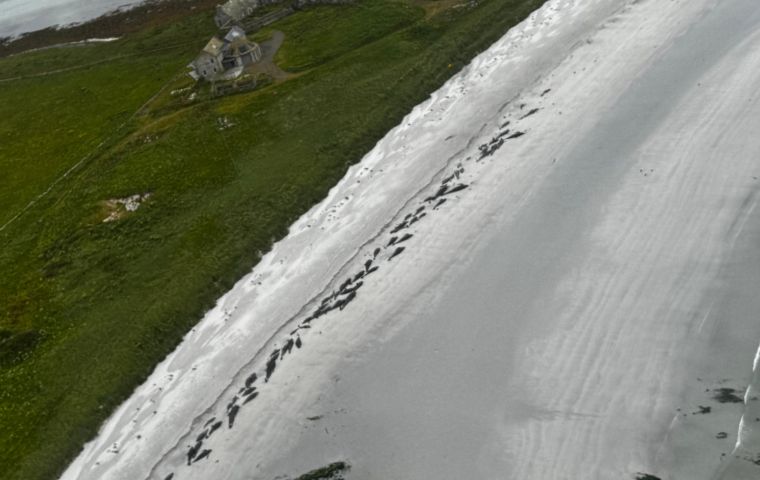MercoPress. South Atlantic News Agency
Huge pod of pilot whales stranded, and die in island off Orkney archipelago
 “The remaining 12 pilot whales have been euthanized due to their condition deteriorating from so many hours on the beach,” the BDMLR said
“The remaining 12 pilot whales have been euthanized due to their condition deteriorating from so many hours on the beach,” the BDMLR said Seventy-seven long-finned pilot whales washed ashore on Thursday on Sanday island, a part of the Orkney archipelago off Scotland. Sixty-five of them were already dead, the British Divers Marine Life Rescue (BDMLR) service said, and while twelve still alive, they were in too poor a condition to recover.
“Sadly the remaining 12 pilot whales have been euthanized due to their condition deteriorating from the many hours they have spent stranded on the beach,” the BDMLR said in an update.
It said lying on the beach for a long time likely led to “crush injury from their own weight and the high likelihood that they have inhaled water with the incoming tide.”
The charity said the whales had sunk deeper into the sand as the tide washed over them and were unable to refloat themselves.
The Orkney Islands are an archipelago situated just off the northeastern tip of mainland Scotland. Sanday is to the northeast of the group of islands, nearer the open waters.
Heading to Orkney to help our friends @strandings #CSIOfTheSea investigate one of the largest pilot whale mass strandings ever recorded in the UK. 77 pilot whales died yesterday, CSIP team from all parts of the UK heading there now, long few days ahead... #strandingsteamassemble pic.twitter.com/0SxQU5c1xR
— Rob Deaville (@strandings_man) July 12, 2024
“There are no obvious indications as to why they all stranded,” the BDMLR said, adding that it would try to recover and conduct postmortem examinations on as many as possible.
Such mass strandings are not uncommon among pilot whales, who tend to travel in tightly-knit groups, but scientists are still trying to ascertain why the phenomenon occurs.
“This is definitely one of the larger mass strandings, but not necessarily the largest,” the BDMLR reported to local media. In 2023, about 55 pilot whales were stranded on the island of Lewis, off Scotland's northwest coast.
Larger mass strandings involving the whales are also quite common around Australia, New Zealand and occasionally the Falkland Islands.
The fact is that some whale species live in social groups, “pods”, with a leader the others follow. If the lead animal finds itself close to the shore and in trouble, it can send out a distress signal. The whales following behind may try to help and end up stranded themselves.
Other scientists believe whales become stranded is because of overfishing forces the marine mammals to seek food in unfamiliar and potentially shallow waters where they become trapped. There is also some evidence that naval sonar can disrupt and confuse the animals while migrating.




Top Comments
Disclaimer & comment rulesCommenting for this story is now closed.
If you have a Facebook account, become a fan and comment on our Facebook Page!